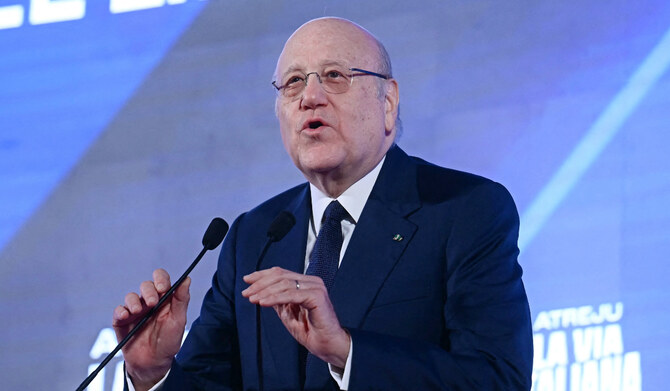BEIRUT: Lebanese Prime Minister Najib Mikati on Saturday questioned Israel’s commitment to the ceasefire deal brokered by the US and France following a deadly drone strike in the south of the country — the latest attack in what appears to be an increasingly shaky truce.
Speaking during a meeting in Rome with a group of Arab diplomats, Mikati highlighted the challenges facing Lebanon and accused Israel of repeatedly violating the truce.
The drone strike that killed a motorist in southern Lebanon on Saturday added to fears that the ceasefire deal struck between Israel and Hezbollah two weeks ago is under growing strain.
The attack targeted a car on the Khardali road, which links the two sides of the Litani river, and connects Nabatieh to Marjayoun in southern Lebanon.
The drone strike set the vehicle on fire, killing the driver, who was later identified as Mohsen Charafeddine from Kfartebnit.
Israeli reconnaissance planes have continued to hover over southern Lebanon and Beirut’s southern suburbs around the clock.
Mikati told the Arab ambassadors accredited to Italy that “the main challenge facing Lebanon is to oblige the committee tasked with following up on this file, Israel, to stop its violations and withdraw its forces from Lebanese territory.”
He added: “We are waiting for these measures to be implemented with an American-French guarantee, but we do not see an Israeli commitment to that.”
The prime minister said the Lebanese army has begun expanding its deployment in the south, and morale is high.
“It is working to impose the authority of Lebanese legitimacy, ensuring no weapons outside the framework of legitimate arms.
“We rely on the continued support of our brothers and friends to enable the army to carry out its role fully,” said Mikati.
Also on Saturday, Israeli forces carried out mopping-up operations in the border villages of Mays Al-Jabal and Kfarkila.
After a shepherd named Abdo Abdel Aal went missing in the Majidieh area, security authorities said it was likely that Israeli troops had crossed the barbed-wire border toward the Al-Majidieh valley and taken him for questioning.
The Israeli army detained two shepherds last week. Both were freed after interrogation.
Commander of the Works Regiment in the Lebanese army, Brig. Gen. Youssef Haidar, and the Head of the Third Operations Division in the Seventh Brigade, Brig. Gen. Joseph Mazraani, visited the southern Lebanese town of Khiam on Saturday to inspect recovery work there and the clearing of roads in preparation for the return of residents.
On Wednesday, Israeli forces conducted their first withdrawal from Khiam — and were replaced by Lebanese troops.
Lebanese army bulldozers continued clearing roads around the Khiam detention center and the Matal Al-Jabal area.
Videos shared on social media revealed the extent of damage caused by Israeli forces in Khiam, including the demolition of residential buildings and commercial establishments, and the destruction of roads.
The army is coordinating with the Lebanese Red Cross to begin recovering the bodies of Hezbollah members killed during the conflict in the rugged Wadi Al-Asafir area, south of Khiam.
The Lebanese army continued surveying and inspecting southern areas damaged by Israeli attacks.
An army engineering team detonated unexploded rockets and cluster bombs in the towns of Qleileh, Al-Mansouri, Al-Haniya, and Al-Amriyah in the western sector.
A 15-year-old boy was badly injured earlier in the week in Shabriha in the Tyre district after a cluster bomb he picked up exploded.
Meanwhile, the Lebanese University administration issued a statement on Saturday in response to information circulating on social media regarding the alleged discovery of weapons in one of its buildings.
The administration requested “refraining from circulating such news and exaggerating it in public, pending the results of the investigation being conducted by the security agencies.”
It also said that “during an inspection of the university buildings and centers to assess the damage caused by Israeli attacks in the vicinity of its facilities, a change in the locks of one of the rented warehouses designated for storing consumable materials and equipment was discovered.”
The warehouse is located in the Al-Janah area on the outskirts of southern Beirut.
The administration said an inspection of the warehouse found contents including “military clothing, travel bags, and sealed boxes.”
Investigations are continuing, it added.



























